初一英语人教版Unit 5 Do you have a soccer ball任务单
人教版英语七上 U5 Do you have a soccer ball 讲义

Unit5 Do you have a soccer ball?一、重点词汇及拓展1. have v.(1) 有e.g. I have a pen. 我有一只钢笔。
(2) 吃;喝e.g. I have breakfast every day. 我每天吃早饭。
(3) 经历e.g. have a good time 玩得开心;过得愉快(4) 上课e.g. We have English lessons every day. 我们每天上英语课。
(5) 举办e.g. Mark has a party. 马克举办了一个派对。
(6) 得…病e.g. He has a cold and a headache. 他感冒和头疼。
2. let v.允许;让let’s = let us 让我们let sb. do sth. 让某人做某事let sb. not do sth. 让某人不要做某事e.g. Let’s have a party tonight! 让我们今晚举办一个派对吧!make sb. do sth. 使某人做某事e.g. The movie makes me miss my mother. 这部电影使我怀念我的妈妈。
3. go v.去;走go to +地点去某地go to school 去学校go here/there/home 去这儿/去那/回家go shopping 去购物go swimming 去游泳go hiking 去远足go skating 去轮滑go boating 去划船4. lateadj. 迟的;晚的be late for school 上学迟到be late for class 上课迟到1be late for work 上班迟到adv. 迟地;晚地later adv. 后来;以后e.g. Three days later, he found his father. (句中有段时间+later,句子用一般过去时)三天后,他找到了他的爸爸。
Unit 5 Do you have a soccer ball 知识点归纳-七年级上册英语

人教版新目标七上英语单元知识点归纳Unit 5 Do you have a soccer ball?重点词汇tennis/'tenis/ n. 网球bat /bæt/ n. 球棒;球拍soccer ball (英式)足球volleyball/'vɔlibɔ:l/ n. 排球basketball/'ba:skitbɔ:l/ n. 篮球late/leit/ adj. 迟到great/greit/ adj. 美妙的;伟大的play/plei/ v. 参加(比赛或运动);玩耍sound/saund/ v. 听起来好像interesting/'intrəstiŋ/ adj. 有趣的boring/'bɔ:riŋ/ adj. 没趣的;令人厌倦的fun/fʌn/ adj. 有趣的;使人快乐的n.乐趣;快乐difficult/'difikəlt/ adj. 困难的relaxing/ri'læksiŋ/ adj. 轻松的;令人放松的watch/wɔtʃ/ v. 注视;观看same/seim/ adj. 相同的easy/'i:zi/ adj. 容易的;不费力的class/kla:s/ n. 班级;课classmate/'kla:smeit/ n. 同班同学重点短语:a tennis bat 一个网球拍play basketball 打篮球baseball bat 棒球棒have a soccer ball 有一个足球play soccer 踢足球with our friends 和我们的朋友一起have a ping-pong ball 有一个乒乓球play ping-pong 打乒乓球have a volleyball 有一个排球play volleyball 打排球at school 在校,上学play sports 做运动watch TV 看电视in my bag 在我的包里be late 迟到on TV 电视上必背典句:1. Do you have a soccer ball? 你有一个足球吗?2. Does he/she have a ping-pong ball?他/她有一个乒乓球吗?3. Do you play sports with your classmates? 你和你的同学一起做运动吗?4. Let’s play soccer together! 我们一起踢足球吧!5. How many sports do you like?你喜欢多少种运动?6. I like playing soccer and basketball. 我喜欢踢足球和打篮球。
英语人教版七年级上册Unit5 Do you have a soccer bal
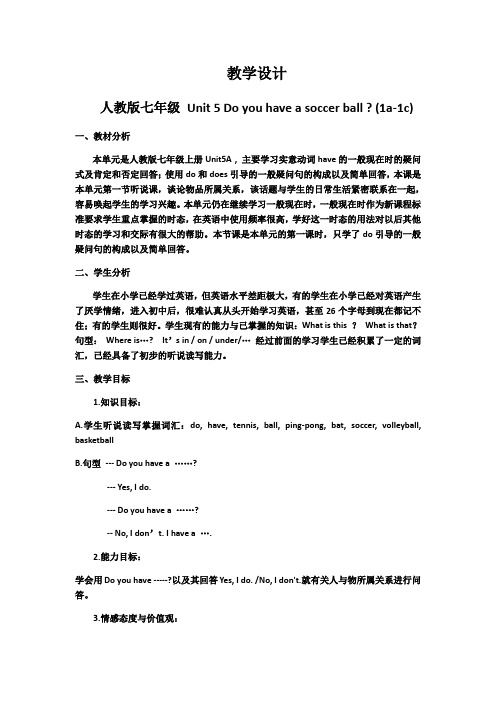
教学设计人教版七年级Unit 5 Do you have a soccer ball ? (1a-1c) 一、教材分析本单元是人教版七年级上册Unit5A , 主要学习实意动词have的一般现在时的疑问式及肯定和否定回答;使用do和does引导的一般疑问句的构成以及简单回答,本课是本单元第一节听说课,谈论物品所属关系,该话题与学生的日常生活紧密联系在一起,容易唤起学生的学习兴趣。
本单元仍在继续学习一般现在时,一般现在时作为新课程标准要求学生重点掌握的时态,在英语中使用频率很高,学好这一时态的用法对以后其他时态的学习和交际有很大的帮助。
本节课是本单元的第一课时,只学了do引导的一般疑问句的构成以及简单回答。
二、学生分析学生在小学已经学过英语,但英语水平差距极大,有的学生在小学已经对英语产生了厌学情绪,进入初中后,很难认真从头开始学习英语,甚至26个字母到现在都记不住;有的学生则很好。
学生现有的能力与已掌握的知识:What is this ?What is that?句型:Where is…? It’s in / on / under/…经过前面的学习学生已经积累了一定的词汇,已经具备了初步的听说读写能力。
三、教学目标1.知识目标:A.学生听说读写掌握词汇:do, have, tennis, ball, ping-pong, bat, soccer, volleyball, basketballB.句型--- Do you have a ……?--- Yes, I do.--- Do you have a ……?-- No, I don’t. I have a ….2.能力目标:学会用Do you have -----?以及其回答Yes, I do. /No, I don't.就有关人与物所属关系进行问答。
3.情感态度与价值观:A热爱体育活动,培养适合自己的体育爱好,锻炼身体。
B.在小组活动中,培养学生团结协作精神。
人教版七年级上Unit5 Do you have a soccer ball知识点归纳
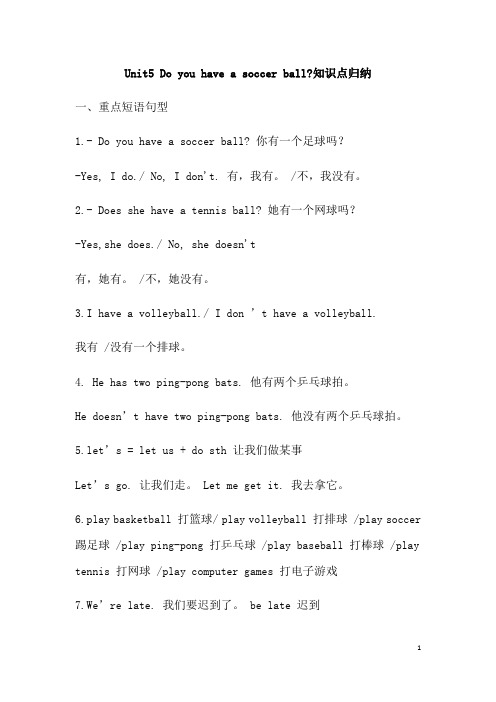
Unit5 Do you have a soccer ball?知识点归纳一、重点短语句型1.- Do you have a soccer ball? 你有一个足球吗?-Yes, I do./ No, I don't. 有,我有。
/不,我没有。
2.- Does she have a tennis ball? 她有一个网球吗?-Yes,she does./ No, she doesn't有,她有。
/不,她没有。
3.I have a volleyball./ I don ’t have a volleyball.我有 /没有一个排球。
4. He has two ping-pong bats. 他有两个乒乓球拍。
He doesn’t have two ping-pong bats. 他没有两个乒乓球拍。
5.let’s = let us + do sth 让我们做某事Let’s go. 让我们走。
Let me get it. 我去拿它。
6.play basketball 打篮球/ play volleyball 打排球 /play soccer 踢足球 /play ping-pong 打乒乓球 /play baseball 打棒球 /play tennis 打网球 /play computer games 打电子游戏7.We’re late. 我们要迟到了。
be late 迟到8.That sounds good. 那听起来很不错。
That sounds interesting/fun/relaxing/boring/difficult. 那听起来很有趣 /放松 /无聊 /困难。
9.watch TV 看电视10.play sports with our classmates 和我的同学做运动11.go to the same school 去同一间学校上学。
12.at school 在学校13.only watch them on TV 只在电视上看它们14.It ’s adj(形容词) for sb.对某人来时怎么样。
人教版七年级上册英语Unit5Doyouhaveasoccerball
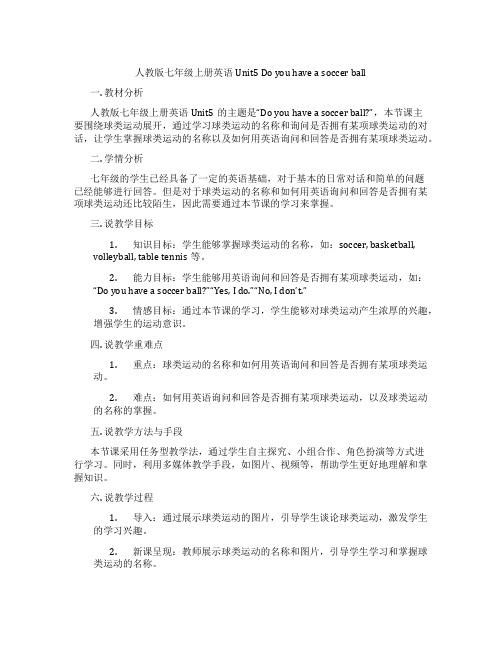
人教版七年级上册英语Unit5 Do you have a soccer ball一. 教材分析人教版七年级上册英语Unit5的主题是“Do you have a soccer ball?”,本节课主要围绕球类运动展开,通过学习球类运动的名称和询问是否拥有某项球类运动的对话,让学生掌握球类运动的名称以及如何用英语询问和回答是否拥有某项球类运动。
二. 学情分析七年级的学生已经具备了一定的英语基础,对于基本的日常对话和简单的问题已经能够进行回答。
但是对于球类运动的名称和如何用英语询问和回答是否拥有某项球类运动还比较陌生,因此需要通过本节课的学习来掌握。
三. 说教学目标1.知识目标:学生能够掌握球类运动的名称,如:soccer, basketball,volleyball, table tennis等。
2.能力目标:学生能够用英语询问和回答是否拥有某项球类运动,如:“Do you have a soccer ball?”“Yes, I do.”“No, I don’t.”3.情感目标:通过本节课的学习,学生能够对球类运动产生浓厚的兴趣,增强学生的运动意识。
四. 说教学重难点1.重点:球类运动的名称和如何用英语询问和回答是否拥有某项球类运动。
2.难点:如何用英语询问和回答是否拥有某项球类运动,以及球类运动的名称的掌握。
五. 说教学方法与手段本节课采用任务型教学法,通过学生自主探究、小组合作、角色扮演等方式进行学习。
同时,利用多媒体教学手段,如图片、视频等,帮助学生更好地理解和掌握知识。
六. 说教学过程1.导入:通过展示球类运动的图片,引导学生谈论球类运动,激发学生的学习兴趣。
2.新课呈现:教师展示球类运动的名称和图片,引导学生学习和掌握球类运动的名称。
3.对话练习:学生两人一组,模拟对话场景,练习如何用英语询问和回答是否拥有某项球类运动。
4.小组活动:学生分成小组,进行角色扮演,模拟真实场景,运用所学知识进行对话。
人教版英语七年级上册Unit-5--do-you-have-a-soccer-ball

人教版英语七年级上册Unit 5 Do you have a soccer ball?单元教材分析本单元主要学习动词have的一般现在时的用法;使用do和does引导的一般疑问句的构成以及简单回答。
本单元围绕“和朋友一起欢度时光”这一话题安排了三个任务:一是列举所学的运动项目,从中挑选出各自喜欢的体育项目,并说明原因,目的是巩固并新学一些体育项目的名词;二是让学生互相询问所爱好的运动,并根据情况发出邀请,学会用have对物品的所属进行提问与回答,掌握用do和does引导的一般疑问句的构成及使用,了解用Let’s 提建议的句型;三是写作,把任务一、二的完成情况写成日记,进一步复习、巩固所学的语言目标。
通过本单元的学习,学会用have对物品的所属进行提问与回答;学会用let’s…句型提建议;能够谈论自己喜欢哪些球类运动,不喜欢哪些球类运动及原因;能够谈论怎样和自己的朋友度过一段愉快的时光。
单元总体目标.1. 在询问对方是否有某物的对话中学会使用do和does引导的一般疑问句。
2. 学会使用描述性的形容词来评价事物。
3. 学会在对话中使用名词复数。
4. 学会用祈使句来向对方提出建议。
5. 学会用祈使句询问某人是否有某物。
6. 学会向他人提出建议的句子。
7. 学习了解一般现在时。
8. 在本单元中,通过阅读有关运动的文章和对话,使学生更加热爱体育活动并培养一种适合自己的体育爱好。
9.在小组活动中,培养学生团结协作精神。
单元重难点一览表本单元的主题是使用have对物品的所属进行提问及回答,以掌握行为动词在一般现在时中的构成和使用;同时引导学生使用所学的句型谈论自己在球类运动中的喜好。
行为动词在一般现在时的肯定句、否定句和一般疑问句中的构成和使用是初中英语教学中非常重要的内容,本单元知识的掌握程度将直接影响今后的英语学习。
学生在以前的学习中已经掌握了be动词在一般现在时中的构成和使用,在学生的头脑中也已经形成了一个模式,这种模式将直接影响学生对本单元知识内容的接受,所以教师在教学中一定要善于引导,以免学生养成不良习惯。
人教七年级英语上册 Unit 5 Do you have a soccer bal
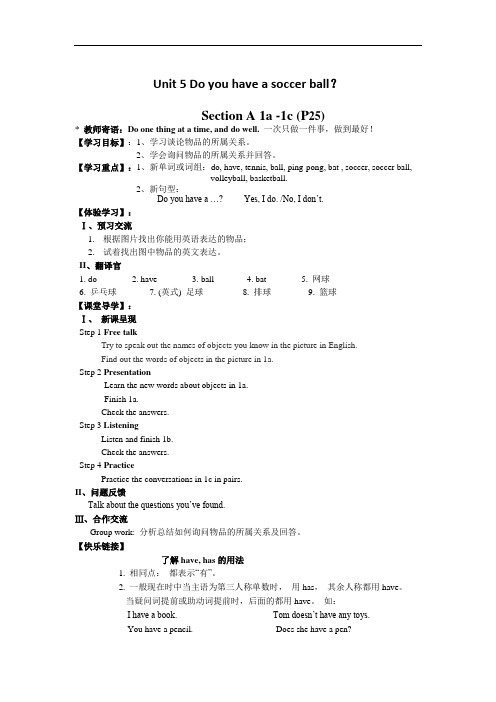
Unit 5 Do you have a soccer ball?Section A 1a -1c (P25)* 教师寄语:Do one thing at a time, and do well. 一次只做一件事,做到最好!【学习目标】:1、学习谈论物品的所属关系。
2、学会询问物品的所属关系并回答。
【学习重点】:1、新单词或词组:do, have, tennis, ball, ping-pong, bat , soccer, soccer ball,volleyball, basketball.2、新句型:-- Do you have a …? -- Yes, I do. /No, I don’t.【体验学习】:Ⅰ、预习交流1.根据图片找出你能用英语表达的物品;2.试着找出图中物品的英文表达。
II、翻译官1. do _______2. have _______3. ball _______4. bat _______5. 网球______6. 乒乓球_______7. (英式) 足球________8. 排球_______9. 篮球_______【课堂导学】:Ⅰ、新课呈现Step 1 Free talkTry to speak out the names of objects you know in the picture in English.Find out the words of objects in the picture in 1a.Step 2 PresentationLearn the new words about objects in 1a.Finish 1a.Check the answers.Step 3 ListeningListen and finish 1b.Check the answers.Step 4 PracticePractice the conversations in 1c in pairs.II、问题反馈Talk about the questions you’ve found.Ⅲ、合作交流Group work: 分析总结如何询问物品的所属关系及回答。
人教版七年级Unit5Doyouhaveasoccerball
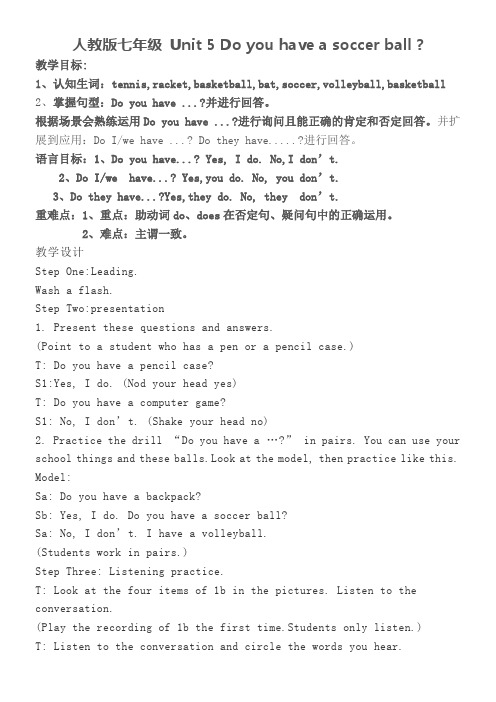
人教版七年级Unit 5 Do you have a soccer ball ?教学目标:1、认知生词:tennis,racket,basketball,bat,soccer,volleyball,basketball2、掌握句型:Do you have ...?并进行回答。
根据场景会熟练运用Do you have ...?进行询问且能正确的肯定和否定回答。
并扩展到应用:Do I/we have ...? Do they have.....?进行回答。
语言目标:1、Do you have...? Yes, I do. No,I don’t.2、Do I/we have...? Yes,you do. No, you don’t.3、Do they have...?Yes,they do. No, they don’t.重难点:1、重点:助动词do、does在否定句、疑问句中的正确运用。
2、难点:主谓一致。
教学设计Step One:Leading.Wash a flash.Step Two:presentation1. Present these questions and answers.(Point to a student who has a pen or a pencil case.)T: Do you have a pencil case?S1:Yes, I do. (Nod your head yes)T: Do you have a computer game?S1: No, I don’t. (Shake your head no)2. Practice the drill “Do you have a …?” in pairs. You can use your school things and these balls.Look at the model, then practice like this. Model:Sa: Do you have a backpack?Sb: Yes, I do. Do you have a soccer ball?Sa: No, I don’t. I have a volleyball.(Students work in pairs.)Step Three: Listening practice.T: Look at the four items of 1b in the pictures. Listen to the conversation.(Play the recording of 1b the first time.Students only listen.)T: Listen to the conversation and circle the words you hear.(Play the recording again.)T: Check their answers.S:…Step Four: Practice the conversations.1. Read the conversations in 1c.(Ask students to repeat.)2. Look at the picture in 1a and practice the conversation with each other in pairs.S1:Do you have…?S2:Yes, I do.S1:Do you have a …?S2:No, I don’t.3. Work in groups of four and use the picture to practice the similar conversations with the new words.(television,basketball, baseball bat, soccer ball, volleyball,television)T:Ask and answer the questions as many as you can.S1:Do you have a … ?S2: …S1: …S2: …Step Five: Task.T: Make a survey about “ What kind of balls do the students have?” We want to have a ball game. But we don’t know what kind of balls you have. Please ask your classmates in the group what balls he/ she has. Then write down the information in the chartStep Six:Summery and homework.In this lesson,we have learned:1、New words:let let’s.go,we,late,has,get,play,sound,great2、Sentences:1、Do you have...? Yes, I do. No,I don’t.2、Do I/we have...? Yes,you do. No, you don’t.3、Do they have...?Yes,they do. No, they don’t.板书设计Do you have...? Yes, I do. No,I don’t.Do I/we have...? Yes,you/we do. No, you/we don’t.Do they have...?Yes,they do. No, they don’t.Does he/she have ....?Yes,he/she does. No,he/she doesn’t.。
人教版英语七年级上册 Unit 5 Do you have a soccer ball_

Period 1(SectionA1a-2c)
Sentences Sports things
Do you have a…?soccer ball ping-pong ball
Yes, I do. /No I don’t.basketball ping-pong bat
5. Let Ss do the pair work according to the chart.
4.Do the listening,writing and reading practice.
5.Make conversations in pairs.
Consolidation
1.Let Ss practice the conversation : Does he/she have a/an… ?.Yes,he/she does./No, he/she does’t.
2.Tell Ss. to do the groupwork.
1.Practice making
conversations :Doeshe/she
have a/an… ?Yes,he/she does./No, he/she does’t.
2.Do some exercises.
3.Ss.work in groups to talk about the ownership in the room.
设计主题
Unit 5 Do you have a soccer ball?
Period 1 Section A 1a-2c
1.教学
内容
1)Words & expressions: have, soccer ball, tennis, racket, tennis racket, ping–pong, volleyball, basketball, bat.
七年级英语上册《Unit 5 Do you have a soccer ball》知识点 (新版)人教版

Unit 5 Do you have a soccer ball?1. Do you have......? Yes, I do. No, I don’t..你有……吗?是的,我有。
不,我没有。
Do they have......? Yes, they do. No, they don’t..Does he have......? Yes, he does. No, he doesn’t.Does she have......? Yes, she does. No, she doesn’t.在一般现在时中,句子的谓语动词若是实义动词,常借助助动词do或does来构成否定句或疑问句。
Does用于主语是第三人称单数的句子中,其他情况用do。
2. do/does1)作助动词,帮助构成一般现在时的否定句或疑问句,无意义。
Do you have a soccer ball? 你有足球吗?I don’t know. 我不知道。
Does Jim have a sister? 吉姆有妹妹吗?What does he like? 他喜欢什么?He doesn’t like English. 他不喜欢英语。
2) 作实义动词,“做,干”。
I do my homework every day. 我每天都做家庭作业。
Bob does his homework every day. 鲍勃每天都做家庭作业。
3) 在一般现在时中,do/does 可用来替代上文出现过的动词,以避免重复。
Do you have a soccer ball? 你有足球吗?Yes, I do. 是的,我有。
(do 代have)Does she have an eraser? Yes, she does.I don’t have a soccer ball, but my brother Alan d oes.我没有足球,但我的哥哥艾伦有。
3.Let’s do sth. “(让)我们做某事吧。
人教版七年级上册英语讲义 Unit 5 Do you have a soccer ball

Unit5 Do you have a soccer ball?讲义一、【重点单词】do /du:/助动词,帮助构成一般现在时的否定句或疑问句,无意义;实义动词“做,干”have /hæv/有tennis /'tenɪs/网球ball /bɔ:l/球ping-pong乒乓球bat /bæt/球棒;球拍soccer /'sɑ:kər/,/'sɒkə/(英式)足球soccer ball(英式)足球volleyball /'vɒlɪbɔ:l/排球basketball /'bɑ:skɪtbɔ:l/篮球let /let/允许;让us /ʌs/ (we的宾格)我们let's = let us让我们(一起)go /ɡəʊ/去;走we /wi:/我们late /leɪt/迟到has /hæz/有(have的第三人称单数形式)get /ɡet/去取(或带来);得到great /ɡreɪt/美妙的;伟大的play /pleɪ/参加(比赛或运动);玩耍sound /saʊnd/听起来好像interesting /'ɪntrəstɪŋ/有趣的;使人快乐的;乐趣;快乐difficult /'dɪfɪkəlt/困难的relaxing /rɪ'læksɪŋ/轻松的;令人放松的watch /wɒʧ/注视;观看TV /,ti:'vi:/电视same /seɪm/相同的love /lʌv/爱;喜爱with /wɪð/和...在一起;带有;使用sport /spɔ:(r)t/体育运动them /ðem/ /ðəm/他(她、它)们only /'əʊnlɪ/只;仅like /laɪk/喜欢;喜爱easy /'i:zi/容易的;不费力的after /'ɑ:ftə/在...之后class /klɑ:s/班级;课classmate /'klɑ:smeɪt/同班同学二、【重点短语】1. have a volleyball 有一个排球2. play volleyball/tennis 打排球/网球3. have a ping-pong/table tennis 有一个乒乓球4. play ping-pong/table tennis 打乒乓球5. with our friends 和我们的朋友一起6. have a football/soccer ball 有一个足球7. play football/soccer 踢足球8. at school 在校,在上学9. play sports 做运动10. play computer games 玩电脑游戏11. watch TV 看电视12. in the same school 在同一所学校13. after class 下课后14. go to school 去上学三、【重点句型】1. —Do you have a ping-pong bat? 你有一个乒乓球拍吗?—No, I don’t. 不,我没有。
人教七年级上册英语Unit 5 Do you have a soccer ball? 基础知识手册

人教七年级上册英语Unit 5 Do you have a soccer ball?用法集萃1. (That/ it) sounds interesting(fun)/good/difficult/boring/relaxing.那听起来很有趣/好/困难/无聊/轻松。
系动词+ adj.系动词:be; look; sound; smell; taste; feel; get; become2. It’s easy for me.这对我来说挺容易的。
Sth. be + adj. for sb. ……对于某人来说怎么样.for的用法1)供……用,给……的Is this apple for me? 这个苹果是给我的吗?Here is a letter for your mother. 这儿有你妈妈的一封信。
2)作……用(表用途)Do you need bags for sports? 你需要运动包吗?I need a cup for milk. 我需要一个装牛奶的杯子。
3)就……而言,对于……来说For lunch, I like hamburgers and salad. 午饭我喜欢汉堡和沙拉。
For girls, we have T-shirts in all colors.女孩子们可以买到各种颜色的T恤衫。
4)以……的价格(表交换、价格)You can buy socks for only 5 dollars each.你可以买到每双只卖5美元的袜子。
5)for oneself 亲自; 如: Come and see for yourself.你亲自来看看吧。
3. let sb. do sth. 让…做…Let’s do sth 让我们做某事吧。
”表示建议。
(let’s = let us)肯定回答一般用:That sounds good.(那听起来很好)/OK.好的/ All right.好的/ Great.好极了/ Good idea. 好主意否定回答一般用: sorry, I …重点句子点拨:1. That sounds interesting.那听上去很有趣。
人教版 英语 七年级 Unit 5 Do you have a soccer ball

Unit 5 Do you have a soccer ball?Period Three教学目标:1、语言知识:A.在询问对方是否有某物的对话中学会使用do和does引导的一般疑问句;B. 学会使用描述性的形容词来评价事物;C. 学会在对话中使用名词复数;D. 学会用祈使句来向对方提出建议。
2、语言技能:A. 学会用祈使句询问某人是否有某物;B. 学会向他人提出建议的句子。
课前准备教师:准备表格,录音机。
学生:准备调查。
教学设计Step One: Warming up.1. Present the structure of last lesson.(show a volleyball to a student)T:Let’s make a conversation about your sport you like. Do you like volleyball?S1:Yes, I like it very much.(Show a baseball to him or her.)T:What about baseball?S1:No, I don’t. I don’t like it .T:OK.Let’s play volleyball after class.S1:Great.2. Work in pairs and make a similar conversation like this.Step Tw Learn the new words.1. Read the words in 1a.(Point to the five words in 1a and ask students to repeat each one.)Ss:interesting, fun, relaxing, boring, difficult.2. Explain the Chinese meaning of them.3. Then match each picture with one of the words.(Point to the five pictures and ask students to match them.)4. Correct the answer.Step Three: Practice the new words.1. Ask and answer using the description words like this.(Write the list of the subjects today on the blackboard.Teacher points to the subjects. Students say the description words.)T:Is math relaxing?Ss:No, it’s boring.T:Now work in pairs.2. Practice using your pictures.T: Please draw pictures that show something interesting,boring,fun,difficult or relaxing.Then make conversations. Do it like this.(Draw the pictures of a TV and a football on the blackboard.)T:Do you watch TV?S1:Yes. I like it.T:Is it interesting?S1:Yes,it’s very interesting.T:Do you have a football?S1:Yes, I do.T:Is it fun?S1:Yes, it’s fun.And I like it ,too.(Ask a few students to draw and answer it.)3. Change pictures and work in pairs.T:Now please change your partner and work in pairs.Try to guess which of the five words the picture shows.S:…Step Four: Listening(2a).1. One student read the five words in 1a above to the class.T:Next we’ll listen to a conversation. Here are two boys in the conversa tion. What do they want to do ? Listen.2. Students only listen.(Play the recording the first time.)3. Listen again and check the words you hear in 1a.(Play the recording again.)4. Check the answers.Step Five: Listening(2b).T:Practice in recognizing specific vocabulary words in conversation and in writing them.First, listen to the recording in 2b. What does Tony say about the activities? (Point to the blanks where the students write their answers.)(Play the recording the first time. Students only listen.)T:Listen to the conversation and write a word from 1a in each bland.(Play the recording again.)T:Check thd answers.S:…Step Six: Role play.T:Act out the conversation in 2a in pairs.S1:Let’s play computer games.S2:That sounds interestin g but…S1:…S2:…Step Seven: Activity.T:Let’s draw the pictures of other activities whose names you know on the board.For example, one student might draw a picture of a bicycle for “ride a bicycle.” Another might make a drawing of a chess board for “play chess.”Let’s make a conversation like this:S1:Let’s ride our bicycles.S2:That sounds fun.S1:…S2:…Step Eight: Survey.T: I know what balls you have now, but I don’t know what kind of sports do you like or dislike and why. Discuss these questions in your group and fill in the chart. Then each group gives your chart to me. One student of each group must report it.1.I like…2.I don’t like…3.My favorite ball is…4.It’s exciting/ boring…5….likes but he / she doesn’t like…6….and…like…but…。
人教版英语七年级上册Unit_5_Do_you_have_a__soccer_ball教材全解及单元

人教版英语七年级上册Unit 5 Do you have a soccer ball?教材全解及单元测试卷【教材内容解析】Section A1.soccer ball (P. 25)soccer ball表示“(英式)足球”。
I have a soccer ball.2.Do you have a ping pong bat? (P. 25)have用作及物动词,表示“有、拥有”,强调某人拥有某物。
I have a sister.He has a watch.3.Hey, Helen, let’s go! (P. 26)let’s do sth.意为“咱们做某事吧”,用于提出建议或者请求对方同自己一起做某事,肯定回答用OK, All right, That sounds great, Good idea等,否定回答用Sorry, I...。
---Let’s play basketball.---OK.【拓展】let’s包括说话者和听话双方;let us只包括说话者一方。
Let’s do our homework.Please, sir, let us go now.4.We’re late! (P. 26)late用作形容词,表示“迟到、晚的”,be late for表示“……迟到”。
I am never late for school.【拓展】late还可以用作副词,表示“迟地、晚地”。
Today he gets up late.5. Let me get it. (P. 26)get用作及物动词,意为“取、得到”。
We must open the door and get the ball.Can you get a banana for me?6.Well, let’s play basketball. (P. 27)play此处用作及物动词,意为“参加踢/打(球)”,后接球类名词时,前不用冠词。
七年级英语上册 Unit 5 Do you have a soccer ball讲义 (新版)人教新
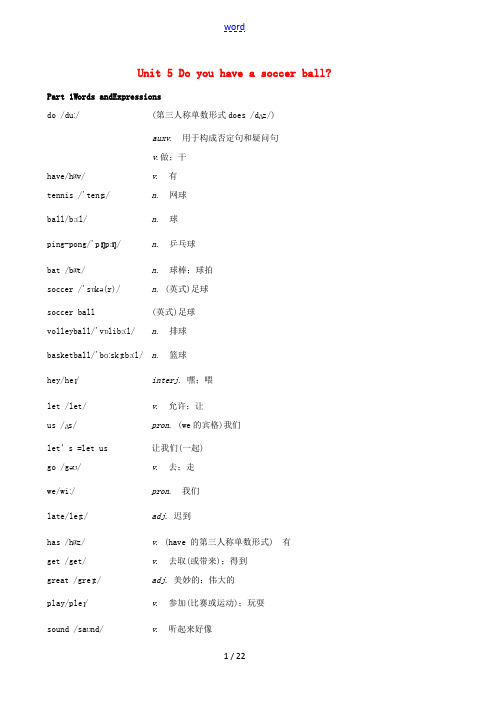
Unit 5 Do you have a soccer ball? Part 1Words andExpressionsdo /duː/ (第三人称单数形式does /dʌz/)auxv. 用于构成否定句和疑问句v.做;干have/hæv/ v. 有tennis /'tenɪs/ n. 网球ball/bɔːl/ n. 球ping-pong/'pɪŋpɔŋ/ n. 乒乓球bat /bæt/ n. 球棒;球拍soccer /'sɒkə(r)/ n. (英式)足球soccer ball (英式)足球volleyball/'vɒlibɔːl/ n. 排球basketball/'bɑːskɪtbɔːl/ n. 篮球hey/heɪ/ interj. 嘿;喂let /let/ v. 允许;让us /ʌs/ pron. (we的宾格)我们let’s =let us 让我们(一起)go /gəʊ/ v. 去;走we/wiː/ pron. 我们late/leɪt/ adj. 迟到has /hæz/ v. (have 的第三人称单数形式) 有get /get/ v. 去取(或带来);得到great /greɪt/ adj. 美妙的;伟大的play/pleɪ/ v. 参加(比赛或运动);玩耍sound /saʊnd/ v. 听起来好像interesting/'ɪntrəstɪŋ/ adj. 有趣的boring/'bɔːrɪŋ/ adj. 没趣的;令人厌倦的fun /fʌn/ adj. 有趣的;使人快乐的n. 乐趣;快乐difficult/'dɪfɪkəlt/ adj. 困难的relaxing/rɪ'læksɪŋ/ adj. 轻松的;令人放松的watch /wɒtʃ/ v. 注视;观看TV/,tiː'viː/ n. (=television /'telɪvɪʒn/)电视;电视机watchTV 看电视same /seɪm/ adj. 相同的love /lʌv/ v.&n. 爱;喜爱with /wɪð/ prep. 和……在一起;带有;使用sport /spɔː(r)t/ n. 体育运动them /ðəm/ pron. (they的宾格) 他(她、它)们only/'əʊnli/ adv. 只;仅like/laɪk/ v. 喜欢;喜爱easy/'iːzi/ adj. 容易的;不费力的after /'ɑːftə(r)/ prep.&conj. 在……之后class /klɑːs/ n. 班级;课classmate/'klɑːsmeɪt/ n. 同班同学Bill /bɪl/ 比尔(男名)Part 2:Texts课文(一)Cindy: Hey, Helen, let’sgo!We’relate!Helen: OK.Cindy: Doyou havethe baseball?Helen: Yes,Ido.It’s in mybag.Cindy: And where’s our baseballbat?Helen: Billhas it.Cindy: Oh,yeah.And doyou haveyour jacket? Helen:Oh, no,Idon’t.It’s on the chair.Let megetit. Cindy: Andyour hat, too!Helen: OK,Ihavemyjacket and hat.Let’sgo!Structure1. Doyou haveabaseball?Yes,Ido./No,Idon’t.Ihaveavolleyball.2. Doyou haveaping-pongbat?Yes,Ido./No,Idon’t. Ihaveaping-pongball.3. Does she haveatennisball?Yes, she does./No, shedoesn’t. Shehas a baseball. 4. Does he haveasoccerball?Yes, hedoes./No. hedoesn’t. Hehas two ping-pongbats.5. Do theyhaveabasketball?Yes, theydo./No, theydon’t.Theyhaveavolleyball.don’t = do not doesn’t = does not句型:—Do/Does sb. have…?—Yes, sb. do /does.—No, sb. don’t /doesn’t.Write eachword inthe correct placeinthe chart.将方框中的单词填入表格中正确的位置。
七年级英语unit5doyouhaveasoccerball人教版知识精讲
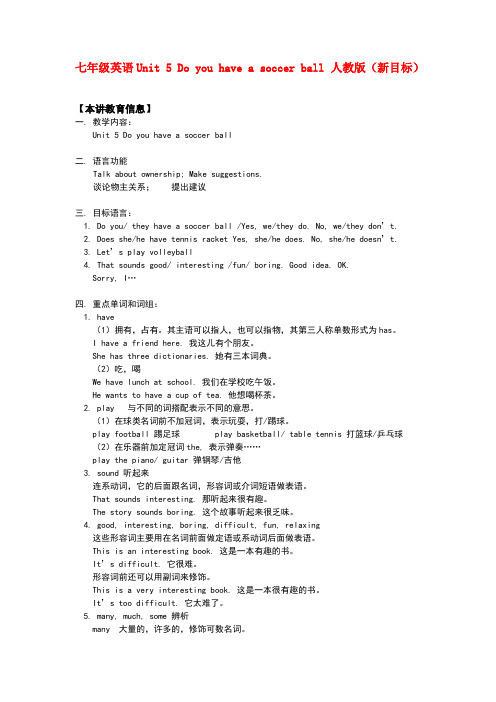
七年级英语Unit 5 Do you have a soccer ball 人教版(新目标)【本讲教育信息】一. 教学内容:Unit 5 Do you have a soccer ball二. 语言功能Talk about ownership; Make suggestions.谈论物主关系;提出建议三. 目标语言:1. Do you/ they have a soccer ball /Yes, we/they do. No, we/they don’t.2. Does she/he have tennis racket Yes, she/he does. No, she/he doesn’t.3. Let’s play volleyball4. That sounds good/ interesting /fun/ boring. Good idea. OK.Sorry, I…四. 重点单词和词组:1. have(1)拥有,占有。
其主语可以指人,也可以指物,其第三人称单数形式为has。
I have a friend here. 我这儿有个朋友。
She has three dictionaries. 她有三本词典。
(2)吃,喝We have lunch at school. 我们在学校吃午饭。
He wants to have a cup of tea. 他想喝杯茶。
2. play 与不同的词搭配表示不同的意思。
(1)在球类名词前不加冠词,表示玩耍,打/踢球。
play football 踢足球play basketball/ table tennis 打篮球/乒乓球(2)在乐器前加定冠词the, 表示弹奏……play the piano/ guitar 弹钢琴/吉他3. sound 听起来连系动词,它的后面跟名词,形容词或介词短语做表语。
That sounds interesting. 那听起来很有趣。
